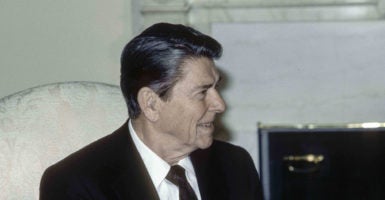Conservatives are blaming the lack of American competitiveness in global markets on burdensome regulations, high taxes, and bad trade deals.
The Conservative Action Project said in an Oct. 17 memo, “Economic Competitiveness and the Defense of Intellectual Property,” that the United States is losing “its global status as a manufacturing powerhouse.”
It says that a major contributor is an attack on America’s intellectual property.
Patent protection “is the main reason that the U.S. has led the world in innovation,” the memo signed by dozens of conservative activists says. “But in recent years, a combination of bad legislation, troubling Supreme Court decisions, [and] anti-patent rhetoric at all levels of our government have weakened the U.S. patent system—once the crown jewel of our economy.”
President Ronald Reagan faced a similar problem in the 1980s, the memo notes, adding that Japan was at the time a threat to “America’s global economic leadership.” It notes that a commission set up by Reagan found one of America’s problems to be “inadequate protection of intellectual property rights.”
The memo states that the Reagan administration strengthened patent protections, and reduced taxes and regulations, to “reverse much of the decline.”
Today, the U.S. faces similar threats to our economic and innovation leadership, but from China and South Korea, rather than Japan.
The memo called for an agenda for improving the country’s global competitiveness that would focus on tax cuts and tax reform, regulatory relief, greater patent protection, and enforcement of trade deals.
It acknowledges that the Trump administration is reducing regulations, but calls for congressional legislation to make regulation reduction permanent because future presidents could undo executive orders.
The memo says that Congress should “push legislation that strengthens” America’s patent protection system.
“The administration, Congress, and the courts need to take steps to reverse the declining protection of patents and the anti-patent rhetoric that has infected government at all levels,” it says. “The administration needs to staff key agencies with individuals who understand the important role of patents and stop administrative action that [makes] it easier to invalidate them.”
It acknowledges that conservatives have differing views on trade, but says that the United States must enforce trade agreements with other nations and not let those nations cheat on, or otherwise undermine, those trade pacts.
The memo also stressed the importance of reversing “the destructive policies of the last eight years (and in many cases longer).”
“The leaders of our movement urge our elected and appointed officials [to] follow the lead of President Reagan by taking strong action to combat the threats to our industrial and innovation competitiveness,” it says.
The memo was signed by more than 70 prominent conservatives, including Edwin Meese III, who served as attorney general in the Reagan administration; Becky Norton Dunlop, chairman of the Conservative Action Project and a White House adviser to Reagan; and Ron Robinson, president of the Young America’s Foundation. Meese and Dunlop are, respectively, the Reagan fellow emeritus and the Reagan fellow at The Heritage Foundation.































